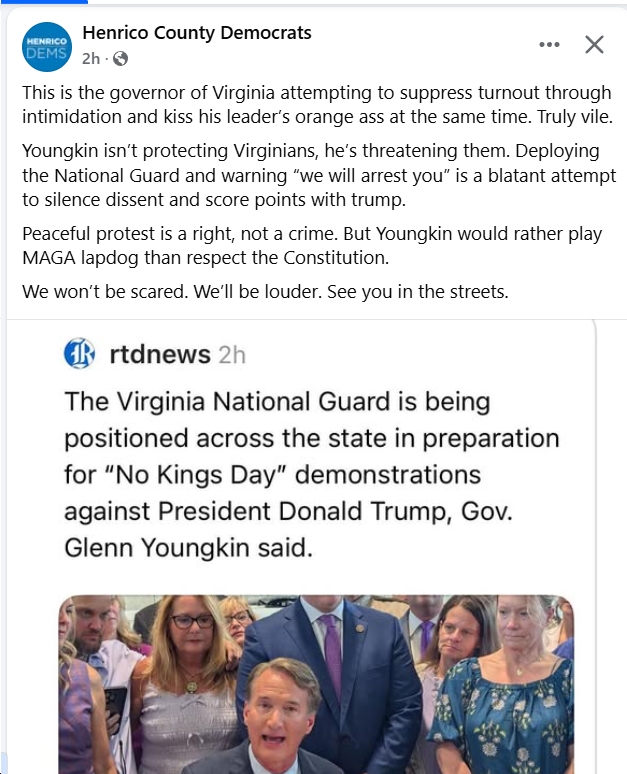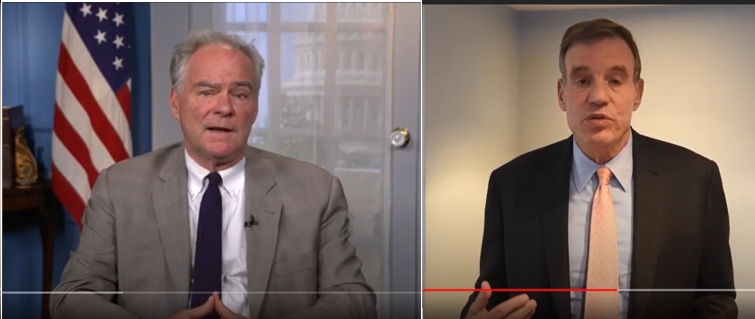By Lynlee Thorne, campaign manager for Brent Finnegan (HD26), and Alex Rohr, campaign manager for Elizabeth Alcorn (HD58)
The 2016 election exposed many painful realities about the culture of the United States. If we’re going to eliminate the barriers upholding systemic oppression, we need to compete in elections at every level. To do that, Democrats need a shift in strategy. The tradition of turning out just enough voters to win statewide left us with a shallow bench and weak connections with voters in many parts of the country. Our neglect of rural areas cost us the Presidency.
Virginians woke up in 2017 and all but flipped a cruelly gerrymandered House of Delegates map by investing energy and money into races previously thought unwinnable. New people turned out to run, volunteer and vote statewide. In rural Virginia, new Democrats showed up to fight in places like Rockingham County, where a rejuvenated committee not only works to elect candidates at every level, but also to speak up for workers who staff local poultry plants. In other localities, new activists came out of hiding, but didn’t have a solid blueprint to build from.
In 2018, Sen. Tim Kaine’s rural field organizers, including the writers of this article, saw that many Democratic activists were frustrated but determined to reach voters with a vision for a Virginia that honors and works for all.
Senator Kaine ran like an underdog committed to competing in every region of Virginia. He backed Jennifer Lewis’ longshot Shenandoah Valley race with the same enthusiasm as Abigail Spanberger’s targeted Richmond suburb seat. He could have walked to victory, but he ran, playing a crucial role flipping three Congressional seats and making measurable gains in other parts of the Commonwealth.
The Senator didn’t give only his time and energy. His field program stretched from the Eastern Shore to the Tennessee and West Virginia borders. Kaine earned hopeful turnout numbers statewide, including a win in HD26, the Shenandoah Valley seat held by Republican Tony Wilt. He also won Lynchburg, a feat Democrats haven’t managed since Kaine ran for governor in 2005.
Out in his Region 3, spanning parts of the 5th, 6th, 7th and 9th congressional districts, Regional Field Director Ian McNally was among those in the campaign who hired locally where he could. By training local Democrats in professional campaigning, the Senator’s war chest left a legacy lasting beyond his own reelection.
After the midterms, Region 3 organizers, Sam Litchford and Alex Rohr, started almost immediately on Christian Worth’s special election campaign before signing up with Tim Hickey in the 59th and Elizabeth Alcorn in the 58th, respectively. Lynlee Thorne went back to work managing Brent Finnegan’s second go at Wilt. Finnegan is in a primary. A fourth went back home to Henrico to work as field director for a state senate race.
We when get resources, we get results.
Worth’s no-sleep special shows the kind of rapid strides rural Democrats can make when we have the resources and trained staff to compete in every precinct, rather than follow the traditional 50%+1 statewide strategy that left doors un-knocked for years. The last Democrat to run in the 24th got 29% of the vote. Worth drew 40% and outperformed Kaine, Northam and Jennifer Lewis in 29 of 42 precincts. Rockbridge County Democrats got to celebrate flipping several precincts for Worth after spending a year crawling up hollers for Lewis.
The Democratic Legislative Campaign Committee offered counsel and donated $5,000, which the campaign used for additional field organizers.
Along with the local volunteer base, neighbors in Roanoke, Lynchburg, Harrisonburg and Rockingham adopted precincts for voter contact. Support came in from across the commonwealth from groups and individuals, such as the Beyond Arlington phone bank. Nearby candidates and their teams pitched in as well, including Finnegan, Lewis, Hickey, Sally Hudson, Jennifer Kitchen, Lauren Thompson and R.D. Huffstetler.
Rural Democrats in Virginia are on the front lines of what some dismiss as “Trump Country.” Now, more candidates are stepping forward in local, state and federal races. We’re having hard conversations with our neighbors and fighting for decency in our communities. We do the work of reaching Democrats in every far-flung precinct because too many of these folks think they’re alone. We let them know that they are not.
Many rural Democrats will gather this weekend at the Rural Retreat in Roanoke hosted by the Party’s Rural Caucus. The event is an opportunity for committees, campaigns and volunteers to build on collaborative efforts across districts, expanding on the gains of the last three years.
We’re coordinating to develop messaging sensitive to rural concerns. We’re adapting field programs to the terrain and culture of our mountainous districts, such as remote GOTV staging locations in Page and Shenandoah counties for the midterm. Meeting our communities where they live increases participation and access to the electoral process.
Every race is winnable. But rural Democrats understand that sometimes victory isn’t necessarily an immediate seat in the legislature. Victory this year might be holding Republican incumbents accountable and making them drain their war chests at home instead of distributing their riches to Republicans in tighter races. Sometimes victory is improving turnout from the last cycle or constructing a new network from scratch.
There’s victory in building a bridge that someone else gets to cross. That work deserves both gratitude and investment.
Just as Virginia’s 2017 House of Delegates race foreshadowed the 2018 midterms, we’ll know this November whether Virginia is ready for 2020. We need to invest all over the state by building a deeper network dedicated to addressing healthcare, education, civil rights, wealth inequality and climate change, advancing justice and dignity in every community.
Rural Democrats are doing the work. If you are in a safe Democratic district, please identify a rural campaign that you can support through donations, volunteer hours and signal boosting.
A few rural wins this year gives us the momentum to continue building and the road map to win nationwide in 2020.

















